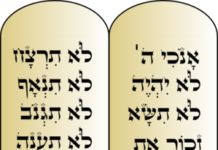Perhaps more than any other area of the Torah, the upcoming Parshiyos (Parshas Vayetze and Vayishlach) express the emotional experiences of its characters. This is particularly true of Yaakov Avinu. He is described with a rich and wide-ranging inner life. Leah and Rachel also present various emotional states. Yaakov’s emotions include fear (28:17, 31:31, 32:8, 32:12), anger (30:2, 31:36), love (29:18, 21), pain and hurt (32:8), resentment (29:31), humility (32:11), and feeling troubled (34:30). Leah expresses feeling hurt (29:32) as well as gratitude (29:35). And Rachel feels jealousy (30:1), despair (30:1), and embarrassment (30:23).
While we often think of the avos and imahos (patriarchs and matriarchs) as super-human, the Torah in this instance focuses on their so-very human emotions. There’s nothing extraordinary about feeling fearful, angry, hurt, resentful, jealous, or hopeless. And there’s nothing extraordinary about feeling humbled, grateful, or loving. This, it seems, may be exactly what the Torah wants us to see. It is completely normal to feel. Even the greatest heroes and superhumans experience a roller-coaster of emotions. Some distressing and overwhelming, and some positive and sweet.
The general population, and the Orthodox community, in particular, have come a long way in recognizing the importance of paying attention to one’s emotional well-being. Nonetheless, there are still ways to go. In my work, I encounter many people struggling to accept the fact that they have emotional needs. They perceive their emotional needs as a weakness or a sign that they are “crazy” or “messed-up” (their words). Perhaps one of the many messages of these parshiyos is that emotional needs do not indicate weakness or abnormality. In fact, if they indicate anything, it’s that you are alive. Sometimes, the help people need is not in solving their emotional struggles, it’s simply allowing for them.
Sometimes, as a parent, spouse, friend, teacher, boss, or rabbi it is essential to serve as a rock of strength and stability. Other times, however, the greatest gift we can offer our children, friends, students or congregants is a glimpse into the fact that we also struggle. The Torah offers us this gift in expressing the vulnerabilities and emotional experiences of Yaakov, Rachel, and Leah. It takes unique strength to acknowledge weakness and give voice to the unseen emotional experience. In this sense, perhaps the avos and imahos were super-human after-all. They were superhuman in their willingness to be human.







